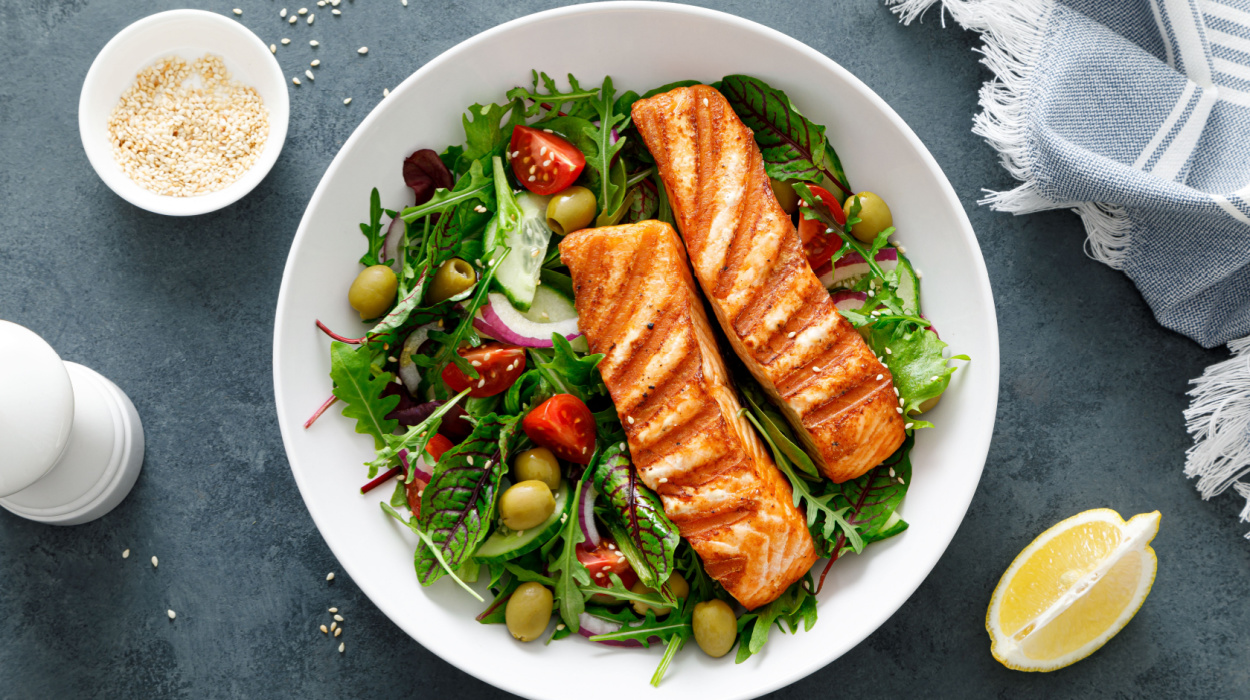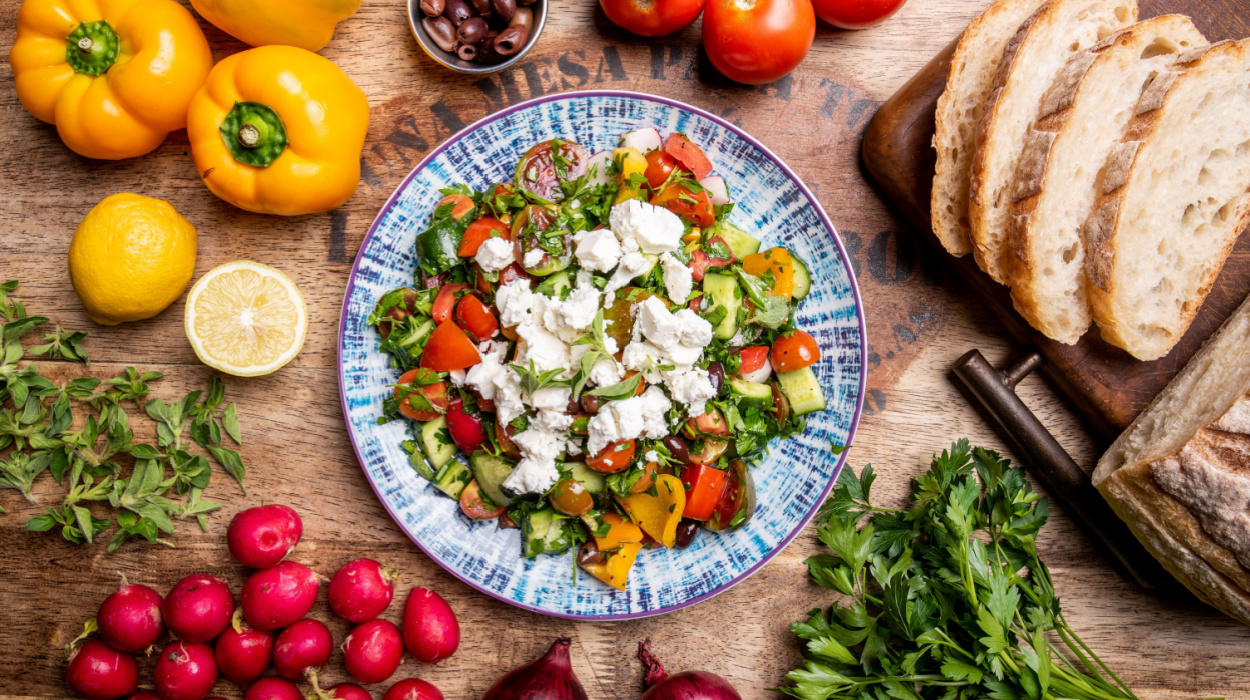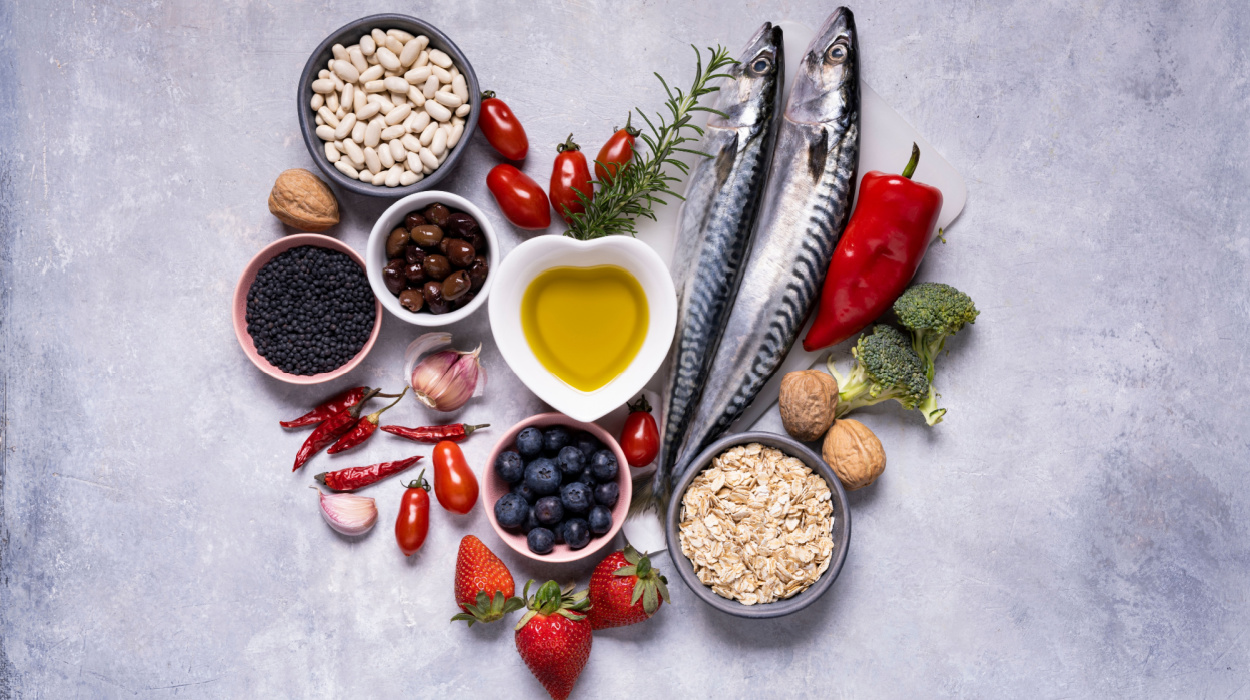 Expert's opinion
Expert's opinion
Expert's opinion
The article is a subjective view on this topic written by writers specializing in medical writing.
It may reflect on a personal journey surrounding struggles with an illness or medical condition, involve product comparisons, diet considerations, or other health-related opinions.
Although the view is entirely that of the writer, it is based on academic experiences and scientific research they have conducted; it is fact-checked by a team of degreed medical experts, and validated by sources attached to the article.
The numbers in parenthesis (1,2,3) will take you to clickable links to related scientific papers.
Green Mediterranean Diet: What It Is? Meal Plan, Pros & Cons 2024

If you’ve already heard about how great the Mediterranean diet is for your health, wait until you learn about the benefits of the green version. New studies show that it can double fat loss[1] and improve many areas of health even more quickly than the classic Mediterranean diet.
While it isn’t a vegan or vegetarian diet, it focuses on plant-based proteins much more than animal sources, particularly red meat. Find out which foods to eat, which to avoid, and what to expect on the green Mediterranean diet.
Keep in mind that with any diet, starting slowly to escape feeling restricted is the best way to avoid yo-yo dieting, weight gain, and disordered eating habits.
Green Mediterranean Diet Plan
Explore the richness of the Green Mediterranean diet with our diverse meal plan, encompassing delicious and healthful green Mediterranean diet recipes:
- Monday: Green Mediterranean Bliss
- Tuesday: Wholesome Mediterranean Delight
- Wednesday: Mediterranean Comfort
- Thursday: Vibrant Mediterranean Day
- Friday: Mediterranean Feast Day
- Saturday: Green Mediterranean Delight
- Sunday: Mediterranean Seafood Day
7-Day Sample Green Mediterranean Diet Meal Plan
If you’re interested in eating more plants, this meal plan will guide you toward new green Mediterranean diet recipes and simple meals you can make in thirty minutes or less.
Monday: Green Mediterranean Bliss (Approx. 1500 Calories)
The Green Mediterranean Bliss meal plan embraces the principles of a wholesome Mediterranean diet, offering a balance of lean proteins, healthy fats, fiber-rich vegetables, and antioxidants. This culinary journey aims to provide both delicious meals and nutritional benefits, making it a delightful choice for those seeking a healthier lifestyle.
| Breakfast | |
| Unsweetened Greek yogurt | One cup |
| Mixed fruits (e.g., berries, kiwi, and green apple) | One half cup |
| Nuts | One quarter cup |
| Seeds | One tablespoon |
| Green tea | One cup |
| Lunch | |
| Eggs | Two |
| Spinach | One half cup |
| Sliced bell peppers | One quarter cup |
| Diced Tomato | One quarter cup |
| Olive oil | One tablespoon |
| Mixed greens (e.g., lettuce, arugula, or spinach) | Two cups |
| Sliced cucumber | One quarter cup |
| Cherry tomatoes | One quarter cup |
| Red onion | Two tablespoons |
| Balsamic vinaigrette | One tablespoon |
| Dinner | |
| Cod fillet | Six oz |
| Olive oil | One tablespoon |
| Rosemary (fresh or dried) | One teaspoon |
| Lemon | One half |
| Cherry tomatoes | One cup |
| Sliced red onion | One half cup |
| Sliced bell peppers | One half cup |
| Potatoes | One half cup |
| Green tea | One cup |
Tuesday: Wholesome Mediterranean Delight (Approx. 1300 Calories)
| Breakfast | |
| Oatmeal | One half cup |
| Flax seeds | One tablespoon |
| Cinnamon | One half teaspoon |
| Walnuts | One tablespoon |
| Mixed fresh berries (e.g., blueberries, raspberries, strawberries) | One half cup |
| Green tea | One cup |
| Lunch | |
| Mixed beans (e.g., chickpeas, kidney beans, black beans) | One cup |
| Cherry tomatoes | One cup |
| Cucumber | One half |
| Red onion | One quarter |
| Fresh parsley | One quarter cup |
| Kalamata olives | Two tablespoons |
| Extra virgin olive oil | Two tablespoons |
| Balsamic vinegar | One tablespoon |
| Dinner | |
| Large shrimp | Eight |
| Mixed vegetables (e.g., bell peppers, broccoli, snap peas, carrots) | One cup |
| Garlic | One clove |
| Olive oil | One tablespoon |
| Low-sodium soy sauce | Two tablespoons |
| Fresh ginger | One teaspoon |
| Mixed berries (e.g., strawberries, blueberries, raspberries) | One half cup |
| Unsweetened Greek yogurt | One half cup |
Wednesday: Mediterranean Comfort (Approx. 1150 Calories)
A wholesome day with a hearty Mediterranean breakfast featuring avocados and soft-boiled eggs on toast. Lunch brings a satisfying hummus and veggie sandwich on whole-grain toast. For dinner, enjoy the comforting flavors of oven-roasted chicken, mixed vegetables, and potatoes seasoned with aromatic herbs. A delightful blend of nutrition and taste, keeping you on the path of the green Mediterranean diet.
| Breakfast | |
| Whole-grain toast | Two slices |
| Sliced avocado | One ripe |
| Soft-boiled eggs | Two |
| Green tea | One cup |
| Lunch | |
| Whole-grain toast | Two slices |
| Hummus | One quarter cup |
| Sliced vegetables (cucumber, tomato, lettuce, bell peppers) | One quarter cup |
| Dinner | |
| Oven-roasted chicken breast | Four oz |
| Mixed vegetables (such as broccoli, carrots, and cauliflower) | One cup |
| Potatoes | One |
| Fresh herbs | Two tablespoons |
| Olive oil | One tablespoon |
Thursday: Vibrant Mediterranean Day (Approx. 1300 Calories)
This meal plan offers a delightful blend of flavors and nutrients. Starting with creamy Greek yogurt and homemade granola for breakfast, followed by a refreshing leftover herbed chicken salad for lunch, and culminating in a zesty lemon and dill salmon dinner with steamed vegetables and sweet potatoes. It’s a day of vibrant, balanced, and delicious Mediterranean-inspired eating, promoting health and well-being.
| Breakfast | |
| Unsweetened Greek yogurt | One cup |
| Homemade granola | One quarter cup |
| Fruit (e.g., berries, sliced banana) | One half cup |
| Walnuts | One tablespoon |
| Green tea | One cup |
| Lunch | |
| Leftover herbed chicken | Four oz |
| Arugula | One cup |
| Strawberries | One half cup |
| Walnuts | One tablespoon |
| Balsamic Vinaigrette | One tablespoon |
| Dinner | |
| Salmon fillet | Four oz |
| Lemon | One half |
| Olive oil | One tablespoon |
| Vegetables (e.g., broccoli, carrots, cauliflower) | One cup |
| Sweet potatoes | One |
Friday: Mediterranean Feast Day (Approx. 1050 Calories)
Mediterranean Feast Day offers a delightful culinary journey inspired by the Mediterranean diet. Enjoy hummus on toast with roasted red peppers and olive oil for breakfast, a Greek salmon salad with crunchy vegetables and vinaigrette for lunch, and a comforting lentil soup with herb-infused roasted vegetables for dinner.
| Breakfast | |
| Hummus | Two tablespoons |
| Toast | One slice |
| Roasted red peppers | One quarter cup |
| Olive oil | One teaspoon |
| Green tea | One cup |
| Lunch | |
| Leftover salmon | Four oz |
| Mixed greens or lettuce | Two cups |
| Sliced cucumber | One half cup |
| Cherry tomatoes | One half cup |
| Red onion | One quarter cup |
| Kalamata olives | Eight olives |
| Feta cheese | One quarter cup |
| Olive oil | One tablespoon |
| Balsamic vinaigrette | One tablespoon |
| Lemon juice | One tablespoon |
| Dinner | |
| Red lentils | One cup |
| Onion | One |
| Carrots | Two medium |
| Celery | Two stalks |
| Garlic | Three cloves |
| Vegetable broth | One teaspoon |
| Ground cumin | One teaspoon |
| Ground coriande | One half teaspoon |
| Smoked paprika | Two tablespoons |
| Olive oil | Two tablespoons |
| Fresh lemon juice | One tablespoon |
| Assorted vegetables (e.g., bell peppers, zucchini, cherry tomatoes) | Four cups |
| Fresh herbs (e.g., thyme, rosemary, oregano) | One teaspoon |
Saturday: Green Mediterranean Delight (Approx. 1150 Calories)
Experience a fusion of Mediterranean flavors with scrambled eggs featuring herbs, garlic, and vegetables on toast for breakfast. For lunch, savor chickpeas mashed on toast paired with grilled eggplant drizzled in tahini. Cap off your day with a delicious tofu stir-fry loaded with peppers, onions, peas, broccoli, and mushrooms, all sprinkled with sesame seeds.
| Breakfast | |
| Scrambled eggs | Two |
| Herbs (e.g., parsley, chives) | One tablespoon |
| Garlic | One clove |
| Vegetables (e.g., bell peppers, spinach) | One half cup |
| Toast | Two slices |
| Green tea | One cup |
| Lunch | |
| Chickpeas (canned, drained) | One cup |
| Toast | Two slices |
| Grilled eggplant slices | Four slices |
| Tahini | Two tablespoons |
| Dinner | |
| Tofu (extra-firm, cubed) | Eight oz |
| Red bell pepper | One |
| Onion | One |
| Peas | One half cup |
| Broccoli florets | One cup |
| Mushrooms | One cup |
| Sesame seeds | One half cup |
Sunday: Mediterranean Seafood Day (Approx. 1150 Calories)
Indulge in the Mediterranean Seafood Delight Day with a breakfast of smoked salmon, dill, and sliced avocados on toast, complemented by a drizzle of olive oil. For lunch, savor a refreshing Greek salad paired with tzatziki and herb-roasted chicken. In the evening, enjoy the savory flavors of grilled scallops served alongside asparagus, lemon juice, and potatoes seasoned with rosemary and oregano.
| Breakfast | |
| Toast | Two slices |
| Smoked salmon | Two oz |
| Dill | One sprig |
| Sliced avocados | One half |
| Olive oil | One tablespoon |
| Green tea | One cup |
| Lunch | |
| Cucumber | One medium |
| Tomatoes | Two medium |
| Red onion | One half |
| Bell peppers | One half |
| Kalamata olives | One quarter cup |
| Feta cheese | One half cup |
| Olive oil | Two tablespoons |
| Fresh parsley | A handful |
| Red wine vinegar | One tablespoon |
| Dried oregano | One teaspoon |
| Greek yogurt | One cup |
| Garlic | One clove |
| Fresh dill | One sprig |
| Lemon juice | Two tablespoon |
| Chicken breast or thighs | Two pieces |
| Fresh herbs (such as rosemary, thyme, or oregano) | One sprigs |
| Dinner | |
| Scallops | Twelve |
| Olive oil | One tablespoon |
| Lemon juice | One tablespoon |
| Garlic | Two cloves |
| Asparagus spears | One bunch |
| Lemon zest | One teaspoon |
| Potatoes | Four medium |
| Fresh rosemary | One sprig |
| Fresh oregano | One sprig |
What Is The Green Mediterranean Diet?
The green Mediterranean diet is similar to the classic Mediterranean diet, with a few exceptions. Poultry and fish replace beef and lamb; there is an emphasis on including walnuts in the diet, and more plant-based proteins are consumed in place of animal proteins. Drinking green tea is also encouraged.
Research shows[2] that the green Mediterranean diet is even healthier since plant proteins have more anti-inflammatory benefits than red meat. These natural plant antioxidants[3] include polyphenols, carotenoids, and vitamins. Polyphenols are particularly potent and found in most plants, such as fruits, vegetables, dark chocolate, walnuts, tea, and wine.
While the Mediterranean diet already offers many health benefits, the green version can double fat loss and improve heart, brain, gut, and metabolic health more quickly.
You wouldn’t necessarily think cutting meat would make such a difference since the amount of red meat recommended in the traditional Mediterranean diet is minimal, but it shows just how much even a small amount of red meat can affect you. It also shows the importance of adding even more plants to our diets.
Benefits Of The Green Mediterranean Diet

If you thought the Mediterranean diet was the healthiest there was, the green version is even better. The following are some benefits of this revised diet:
Improves Cardiovascular Health
Thanks to its heart-healthy oils and plant-based antioxidants, the risk of heart disease[2] and stroke decreases dramatically with the green Mediterranean diet. It also helps to restore healthy blood pressure and cholesterol levels.
Decreases Risk Of Metabolic Disorders
A new study again finds that Mediterranean diets reduce metabolic disorders, especially with a green Mediterranean diet. Metabolic disorders[4] include:
Diabetes
- Reduced fasting blood sugar levels.
- Improved insulin resistance.[5]
Non-alcoholic Fatty Liver Disease
Intrahepatic fat[6] loss can be doubled with the green Mediterranean diet when amplified with green tea and walnuts and reduces non-alcoholic fatty liver disease by half. Intrahepatic fat is associated with abdominal fat and fat surrounding the liver. It’s directly linked to metabolic complications[7] from obesity.
Impressive Visceral And Adipose Fat Loss
Visceral adiposity or hidden body fat is stored inside the stomach and around the organs. It’s related to heart disease, hypertension, diabetes, increased risk of cancer, and more. A Mediterranean diet high in polyphenols, or the green version, can reduce double the visceral fat[1] when compared to the classic Mediterranean diet.
Intrahepatic fat,[8] or waist circumference fat, is also associated with metabolic disorders, such as diabetes. The green Mediterranean diet also doubled intrahepatic fat loss,[6] making it obvious that the more plant-based foods you consume, the healthier your body composition will be.
Supports Healthy Brain Function
Just like the classic Mediterranean diet, the green version can improve memory and decrease the risk of age-related brain atrophy.[9] It helps to protect the brain against degeneration, especially as this relates to insulin, and the green diet improves insulin sensitivity even better than the classic version.
Foods To Eat

The diet focuses on plants with portions of seafood and chicken only now and then. The green Mediterranean diet food list includes:
Raw Nuts And Seeds
- Walnuts, pecans, almonds, cashews, hazelnuts, etc.
- Ground flax and chia seeds, pumpkin, sunflower, hemp seeds, etc.
- Avoid nuts and seeds roasted in vegetable oils with added salt.
Fruits, Vegetables, And Herbs
- Tomatoes, oranges, mandarins, figs, apricots, cherries, etc.
- Dark leafy greens, cruciferous vegetables, root vegetables, mushrooms, etc.
- Rosemary, thyme, oregano, basil, bay leaves, marjoram, parsley, sage, etc.
Beans And Legumes
- Black, kidney, lima, pinto, soy, and navy beans, etc.
- Peas, peanuts, chickpeas, lentils, edamame, etc.
Whole Grains
- Quinoa, buckwheat, bulgur, millet, barley, spelled, whole oats, etc.
Vegetarian-Based Proteins
- Tempeh, tofu, seitan, vegan meats, etc.
- Spirulina, nutritional yeast, vegan protein powder, etc.
Sustainably Caught Fish
- Fatty fish, such as salmon, anchovies, and sardines.
- Shellfish, such as shrimp, clams, mussels, squid, snails, and oysters.
- Whitefish, including hake, cod, and sole.
Chicken And Eggs
If possible, aim to buy organic, free-range chicken meat and eggs.
Coffee, Tea, And Wine
- Aim for one to two cups of coffee with a maximum of 400 milligrams of caffeine,[10] or four cups, per day.
- Try to drink various teas, such as black, green, white, and herbal teas. Green tea is specifically encouraged.
- Women of all ages and men over 65 should have no more than one glass per day. Men under 65 can have up to two glasses per day.
Healthy Fats
- Extra virgin olive oil.
- Avocados and avocado oil.
Foods To Avoid
As with any healthy diet, certain foods are best eaten in smaller amounts. Aim to eat nutrient-dense foods 80 to 90% of the time, and leave processed foods and red meat for the other 10 to 20%.
Red And Processed Meat
- Beef, lamb, pork, veal, venison, goat, etc.
- Sausages, hot dogs, deli meats, beef jerky, etc.
Refined Grains
- White bread, pasta, crackers, white rice, etc.
- Breakfast cereals, baked goods, etc.
Processed Foods
- Fast food, frozen dinners, pizza, etc.
- Chips, microwave popcorn, granola bars, etc.
Refined Oils And Butter
- Soybean, canola, grapeseed oil, corn oil, etc.
- Margarine, butter, and any hydrogenated fats.
Added Sugars And Sugar-Alcohols
- Candy, table sugar, syrup, etc.
- Baked goods.
- Frozen desserts.
- Sugar or sugar alcohol-sweetened beverages.
Foods To Eat In Moderation
While these foods can be included in the green Mediterranean diet, it’s best to avoid eating them daily. Try to include them a few times a week or less. These foods include:
Poultry
- Chicken
- Duck
- Turkey
Dairy
- Milk
- Cream
- Cheese
- Sweetened yogurts
Eggs
- Including duck, chicken, and quail eggs.
Potential Side Effects
The green Mediterranean diet doesn’t have many consequences, but there are a few things to keep in mind, such as:
Feeling Restricted
If you’re used to eating processed foods, refined grains, and meat, it’s easy to look at this diet and feel overwhelmed and restricted. If that’s the case, remember that the most successful healthy lifestyles are ones that begin by slowly adding one healthy habit at a time until it takes no effort at all.
There’s no need to put pressure on yourself to eat a strict diet, especially since restriction usually leads to yo-yo dieting, weight gain, and eating disorders.[11] Think of the easiest way you can add one serving of greens to your day, and don’t add any other goals until it’s become part of your regular routine. You could buy frozen vegetables, for example, and heat up one serving to add to every dinner.
Adding Too Much Fiber Too Quickly
It’s also important to remember that if you don’t normally consume 25 grams of fiber a day, the minimum recommended amount, you may have digestive issues if you quickly increase your intake. Your body needs time to adapt to the extra fiber in its system, so it’s best to go slow. Also, increase your water intake simultaneously since fiber helps increase water retention[12] in the colon.
Aim to add about 5 grams of extra fiber per day and slowly build up to 30 or 40 grams of fiber per day.[13] That could be as simple as adding one banana to your breakfast or snack, with 2.6 grams of fiber, and one cup of broccoli to your lunch or dinner, with 2.4 grams of fiber.
The Bottom Line
The green Mediterranean diet goes one step further from the classical version and eliminates red and processed meats while emphasizing more poultry, fish, and plant-based proteins. Research shows its benefits exceed that of the classic Mediterranean diet, especially when combined with polyphenol-rich foods. These foods include plant-based protein, vegetables, green tea, nuts, and seeds.
While everything can be included in a healthy diet now and then, the green diet aims to have people eating mostly plant-based proteins with few animal products, especially red meat. It’s more similar to a vegetarian diet but still allows space for fish, chicken, and unsweetened Greek yogurt.
For anyone feeling overwhelmed or restricted by this diet, remember that one small diet change at a time creates the best chances for long-term success. There’s no need to jump into this diet with 100% of your effort, especially since that can lead to binge eating later on.
Try to keep your favorite foods and slowly include more servings of fruits, vegetables, and nuts in your day. The most important thing of all is to stay open-minded to new foods and recipes so you can eat healthy food that tastes delicious and leaves you feeling satisfied.
+ 13 sources
Health Canal avoids using tertiary references. We have strict sourcing guidelines and rely on peer-reviewed studies, academic researches from medical associations and institutions. To ensure the accuracy of articles in Health Canal, you can read more about the editorial process here
- Zelicha, H., Kloting, N., Kaplan, A., Yaskolka Meir, A., Rinott, E., Tsaban, G., Chassidim, Y., Bluher, M., Ceglarek, U., Isermann, B., Stumvoll, M., Quayson, R.N., von Bergen, M., Engelmann, B., Rolle-Kampczyk, U.E., Haange, S.-B., Tuohy, K.M., Diotallevi, C., Shelef, I. and Hu, F.B. (2022). The effect of high-polyphenol Mediterranean diet on visceral adiposity: the DIRECT PLUS randomized controlled trial. BMC Medicine, [online] 20(1). doi:10.1186/s12916-022-02525-8.
- Tsaban, G., Yaskolka Meir, A., Rinott, E., Zelicha, H., Kaplan, A., Shalev, A., Katz, A., Rudich, A., Tirosh, A., Shelef, I., Youngster, I., Lebovitz, S., Israeli, N., Shabat, M., Brikner, D., Pupkin, E., Stumvoll, M., Thiery, J., Ceglarek, U. and Heiker, J.T. (2020). The effect of green Mediterranean diet on cardiometabolic risk; a randomised controlled trial. Heart, [online] 107(13), pp.1054–1061. doi:10.1136/heartjnl-2020-317802.
- Xu, D.-P., Li, Y., Meng, X., Zhou, T., Zhou, Y., Zheng, J., Zhang, J.-J. and Li, H.-B. (2017). Natural Antioxidants in Foods and Medicinal Plants: Extraction, Assessment and Resources. International Journal of Molecular Sciences, [online] 18(1), p.96. doi:10.3390/ijms18010096.
- Medlineplus.gov. (2016). Metabolic Disorders. [online] Available at: https://medlineplus.gov/metabolicdisorders.html.
- Guasch-Ferré, M., Merino, J., Sun, Q., Fitó, M. and Salas-Salvadó, J. (2017). Dietary Polyphenols, Mediterranean Diet, Prediabetes, and Type 2 Diabetes: A Narrative Review of the Evidence. Oxidative Medicine and Cellular Longevity, [online] 2017, pp.1–16. doi:10.1155/2017/6723931.
- Yaskolka Meir, A., Rinott, E., Tsaban, G., Zelicha, H., Kaplan, A., Rosen, P., Shelef, I., Youngster, I., Shalev, A., Blüher, M., Ceglarek, U., Stumvoll, M., Tuohy, K., Diotallevi, C., Vrhovsek, U., Hu, F., Stampfer, M. and Shai, I. (2021). Effect of green-Mediterranean diet on intrahepatic fat: the DIRECT PLUS randomised controlled trial. Gut, [online] 70(11), pp.2085–2095. doi:10.1136/gutjnl-2020-323106.
- Fabbrini, E., Magkos, F., Mohammed, B.S., Pietka, T., Abumrad, N.A., Patterson, B.W., Okunade, A. and Klein, S. (2009). Intrahepatic fat, not visceral fat, is linked with metabolic complications of obesity. Proceedings of the National Academy of Sciences, [online] 106(36), pp.15430–15435. doi:10.1073/pnas.0904944106.
- Finucane, F.M., Sharp, S.J., Hatunic, M., Sleigh, A., De Lucia Rolfe, E., Sayer, A.A., Cooper, C., Griffin, S.J., Savage, D.B. and Wareham, N.J. (2013). Intrahepatic Lipid Content and Insulin Resistance Are More Strongly Associated with Impaired NEFA Suppression after Oral Glucose Loading Than with Fasting NEFA Levels in Healthy Older Individuals. International Journal of Endocrinology, [online] 2013, pp.1–7. doi:10.1155/2013/870487.
- Kaplan, A., Zelicha, H., Yaskolka Meir, A., Rinott, E., Tsaban, G., Levakov, G., Prager, O., Salti, M., Yovell, Y., Ofer, J., Huhn, S., Beyer, F., Witte, V., Villringer, A., Meiran, N., B Emesh, T., Kovacs, P., von Bergen, M., Ceglarek, U. and Blüher, M. (2022). The effect of a high-polyphenol Mediterranean diet (Green-MED) combined with physical activity on age-related brain atrophy: the Dietary Intervention Randomized Controlled Trial Polyphenols Unprocessed Study (DIRECT PLUS). The American Journal of Clinical Nutrition, [online] 115(5), pp.1270–1281. doi:10.1093/ajcn/nqac001.
- Office (2021). Spilling the Beans: How Much Caffeine is Too Much? [online] U.S. Food and Drug Administration. Available at: https://www.fda.gov/consumers/consumer-updates/spilling-beans-how-much-caffeine-too-much#:~:text=For%20healthy%20adults%2C%20the%20FDA,associated%20with%20dangerous%2C%20negative%20effects. Mayo Clinic. (2022). The truth about red wine and heart health. [online] Available at: https://www.mayoclinic.org/diseases-conditions/heart-disease/in-depth/red-wine/art-20048281.
- Neumark-Sztainer, D., Wall, M., Guo, J., Story, M., Haines, J. and Eisenberg, M. (2006). Obesity, Disordered Eating, and Eating Disorders in a Longitudinal Study of Adolescents: How Do Dieters Fare 5 Years Later? Journal of the American Dietetic Association, [online] 106(4), pp.559–568. doi:10.1016/j.jada.2006.01.003.
- Ho, K.-S. (2012). Stopping or reducing dietary fiber intake reduces constipation and its associated symptoms. World Journal of Gastroenterology, [online] 18(33), p.4593. doi:10.3748/wjg.v18.i33.4593.
- Lattimer, J.M. and Haub, M.D. (2010). Effects of Dietary Fiber and Its Components on Metabolic Health. Nutrients, [online] 2(12), pp.1266–1289. doi:10.3390/nu2121266.



